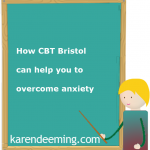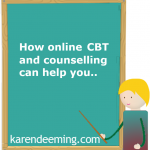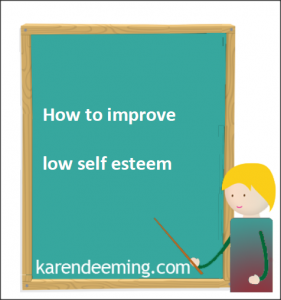
Some people think that self-esteem means confidence – and confidence comes into it – but it’s rather more than that.
There are any number of apparently confident people who can do marvellous things but who have poor self-esteem.
Many people in the public eye fall into this category. Actors, comedians and singers in particular can glow with assurance on stage, yet off-stage feel desperately insecure.
Think of the late Princess of Wales or Marilyn Monroe and you’ll see that public adulation is no guarantee of self-belief.
The word ‘esteem’ comes from a Latin word that means ‘to estimate’. Self-esteem is how you estimate yourself.
To know how you estimate your self esteem, you need to ask yourself certain questions.
- Do I like myself? Do I think I’m a good human being? Am I someone deserving of love? Do I deserve happiness? Do I feel deep down that I’m an okay person? People with low self-esteem find it hard to answer yes to these questions. Perhaps you are one of them. If so, what can you do?
- How can you improve your self-esteem? You can begin by accepting that you are certainly not alone. Masses of people have this problem. Secondly, take on board the fact you are a wonderful, special person – and there is no one quite like you.
- Not only are your fingerprints and DNA different from everyone else’s (unless you have an identical twin), but your mind and how it thinks and operates is totally your own. This means that out of six billion people in the world, you are a one-off. So if nature has bothered to make you unique, don’t you feel you should accept that you’re important, and that you have as much right as anyone else to be on this planet?
You have other rights, too. One of them is the right to make mistakes. Don’t forget that ‘to err is human’ and most of us learn through getting things wrong before we get them right.
Furthermore, we have the right to respect ourselves – and to be respected. Finally, and perhaps most important of all, we have the right to say yes or no for ourselves.
Put your behaviour in perspective
It’s not healthy to condemn ourselves because of one aspect of our behaviour. Sometimes we feel we are ‘no good’ because we have failed an exam or lost a job, or we have been unkind or because we are having an affair.
All of us have many aspects to our personalities, and our current behaviour is just one of those aspects.
Try not to believe that the whole of you is hopeless, unkind or a failure, when really it is just one part of your behaviour that may – or may not – be these things.
Halt destructive thoughts
Many people with poor self-esteem think they’re not very important and their views carry no weight. Is this you?
If so, try to stop these destructive thoughts because if you go around believing them, you’ll encourage other people to believe them too. Instead, start thinking of yourself as someone who has rights, opinions and ideas that are just as valid as anyone else’s. This will help you to improve your self-esteem.
Techniques to improve self-esteem
- Low self esteem feeds on negative thoughts so Don’t indulge in self criticism. Why are you waging war against yourself? Get to know your negative self talk and silence your inner judge/inner critic.
- You can choose to please yourself It is good to you care about other’s feelings but aren’t your needs just as important? Don’t neglect yourself!
- Don’t try to be like someone else. This leads to lack of self worth and confidence. You are unique and you cannot be someone else. Strive to improve but don’t criticise yourself for not being as successful, beautiful, slim or as popular as someone else.
- Take life and yourself less seriously. Failure just means you are not successful YET.
- Everybody fails before succeeding, don’t look on it as failure but as a means to learning. Perhaps you just need a change of direction. Problems make you stronger if you strive to overcome them.
- Self worth, confidence and assuredness increase when you Focus on your needs and desires. You deserve to live life as you want. This is not selfishness as what you want doesn’t hurt others or prevent them from living life on their terms.
- Focus on your successes. Lack of confidence feeds on your feelings of failure and inadequacy. Remember the truly successful things you have done in your life. Reward yourself when you do succeed
- Use visualisation to help you achieve your dreams and increase your self esteem!
- Focus on your strengths. Use them. You will succeed if you are true to yourself.
- Work at achieving your goals. If you do this your confidence will increase and you will feel positive.
Accept yourself for who you are
Learn to accept the things that you cannot change and focus on the positive things about yourself. If you have a mental or physical disability, learn to accept the fact that you cannot change it, and focus on the positive aspects of yourself such as your personality, your ability to be a good friend, and your ability to love and care for others. Associate with people who are positive and supportive. If you surround yourself with negative people, your feeling will tend to be negative. Positive, supportive friends can help to raise your self-esteem by providing a nurturing environment for you.
Focus on your positive qualities – honesty, creativeness, unselfishness, helpfulness, communication skills, and your ability to care for the welfare of others.
Learn to forgive yourself when you do not accomplish all that you set out to. Everyone falls short sometimes, but rather than focusing on the negative aspects, learn to readjust your goals so that you have a better chance of meeting them. Almost any negative experience can be turned into a positive experience with the right attitude.
10-minute technique People with poor self-esteem often fail to give themselves enough time and space. So find 10 minutes every day to be alone, and to just sit and do nothing.
Some people find it helpful to close their eyes and imagine a country scene or the sight and sound of waves gently lapping against the shore.
During this 10 minutes, allow yourself to feel peaceful and happy. Enjoy this time. It is yours – and yours alone.
Accentuate the positive Often we make ourselves unhappy because we go over and over mistakes we have made. But we can improve our self-esteem if we re-think the things we believe we have done wrong or badly.
A low self esteem case study
For example, one of my clients has to give presentations at work. He used to mentally beat himself up after every one and stew over tiny errors. Now he writes an account of each presentation shortly after he’s given it. He writes about all the things that went well. He doesn’t need to write about the bad things – they will stick in his memory and he will try hard not to repeat them – but he will forget the good things unless he writes them down.
So when you have a bad day, or something goes wrong in your relationship or at work, write an account of what went right with that episode, not what went wrong.
The results will surprise you – and improve how you see yourself. List 50 things you like about yourself If you’re seriously lacking in self-esteem this could take weeks, but persevere.
You can write down your characteristics.
You can include things about your looks.
You can even write about the things you do. For example, you may buy a copy of The Big Issue on a day when you’re short of money, or you may help an elderly woman in the supermarket when you’re rushing to get your own shopping done.
When you have reached your 50 good things, keep the list somewhere you can see it all the time. Next comes the harder part. Try to record one more new thing you like about yourself every day for the rest of your life.
Receiving and giving criticism
One of the areas that people with low self-esteem have greatest difficulty with is criticism – giving as well as receiving it. Both can be extraordinarily difficult. Some individuals are demolished by criticism, but it’s something we can’t avoid.
Criticism is often unfair, and when it is we need to counter it by calmly putting our own case across. But some criticism is justified, and when we’re sensible we can learn from it. How to deal with criticism
Often when we’re criticised, we’re so hurt that we start excusing ourselves and rebutting what’s being said without really listening to it.
Listen to criticism without interrupting. If there are aspects to the criticism that are valid, begin by agreeing with those points.
If parts are unclear, ask for clarification.
If you realise you were wrong, say so and apologise.
If criticism is wrong or unfair, smile and say: ‘I’m afraid I don’t agree with you.’ It takes a lot of practice to feel and act this way.
How to give criticism People with poor-self esteem find it hard to dish out criticism.
Many avoid promotion because they can’t face the prospect of being in authority and having to criticise others. So how can you learn to criticise when you have to? Keep calm. Make your criticism at an appropriate time. Don’t wait until you’re so fed up, you’re furious – you’re bound to make a mess of it.
Take some deep breaths, then try a technique called the ‘criticism sandwich’. This means you say something nice, then insert the criticism, then end with another positive. Make sure you only criticise the behaviour, not the person.
An example would be: ‘Your work is usually great, but it’s not quite right today. I’ll have to ask you to re-do that report. I know it’s unlike you to get things wrong, so don’t worry.’
Say I not you
You might notice that people who are fair when they criticise tend to use the word ‘I’ rather than the word ‘you.’ This is because the word I shows you’re in control and that you’ve thought about what you’re saying.
All too frequently we don’t say anything initially, which is when we should address the problem. Instead, we bottle it up until we explode. Then we use the words ‘you’, ‘you’re’ and ‘your’ all the time.
We say: ‘You’re incompetent; you’ve missed the point; your work isn’t up to scratch.’ These phrases sound angry and accusatory. They also show that we’re not in control. And after uttering them, we generally feel worse about ourselves and our self-esteem plummets.
How to say no
These tips are just as handy when it comes to standing up for yourself. They’re useful when you want to say no without feeling guilty. Just keep calm and use the word I. Say: ‘I won’t be coming to that party with you.’ Or: ‘I’m afraid I can’t make it to tea on Saturday because I need to go shopping.’ Or: ‘I’m sorry, I can’t work late tonight, but if you need me to, I can stay tomorrow.’
People with poor self-esteem are always getting talked into doing things they don’t want to do. It must stop if you want to value yourself more.


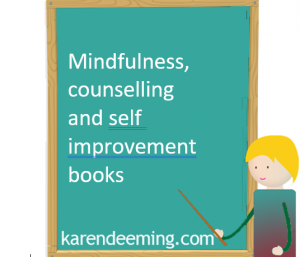

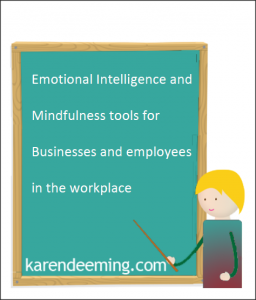

![Karen_Deeminga[1]](http://www.karendeeming.com/wp-content/uploads/2015/09/being-practice-self-portrait-e1541437891746.jpg) Welcome to my site. if you have any queries then please
Welcome to my site. if you have any queries then please
